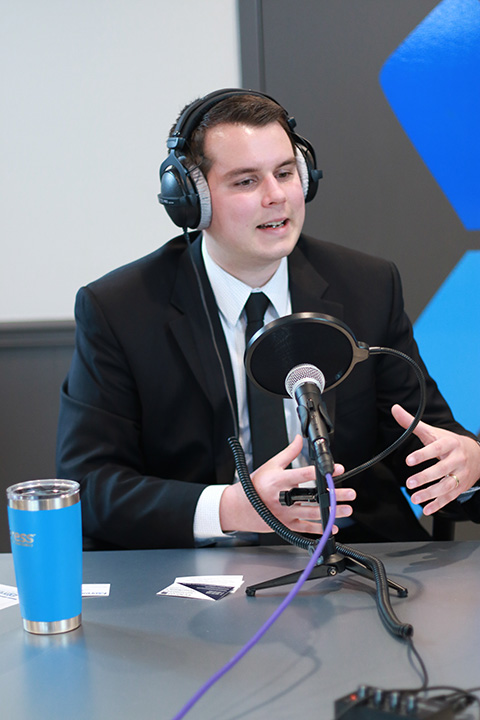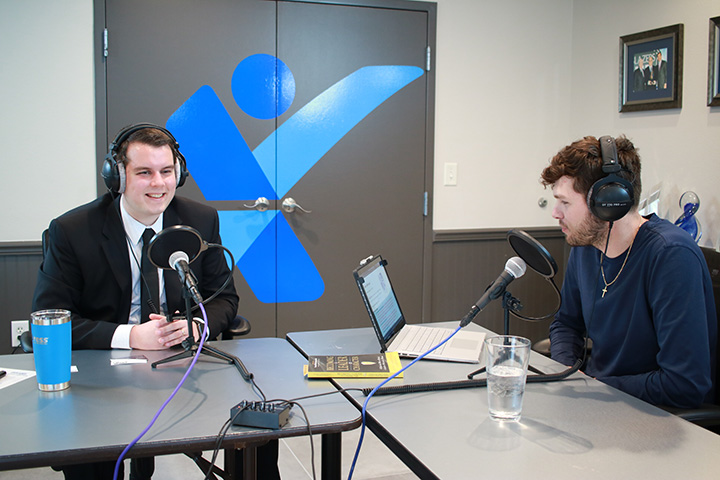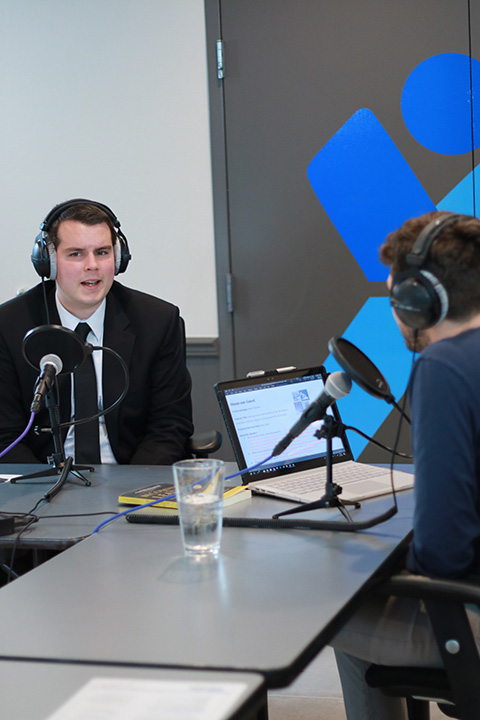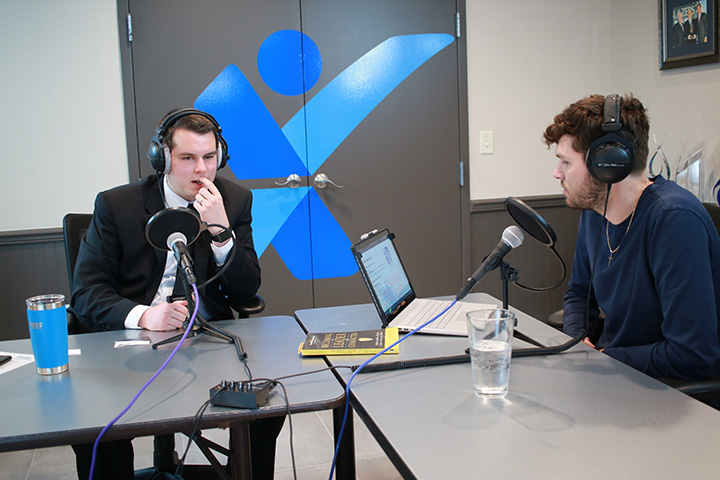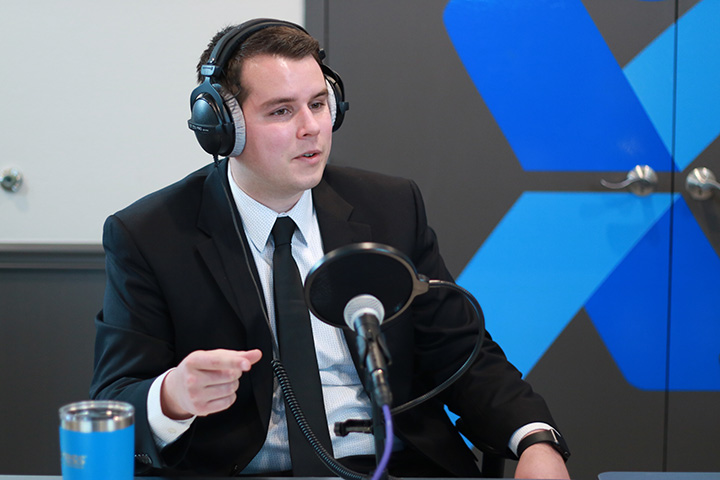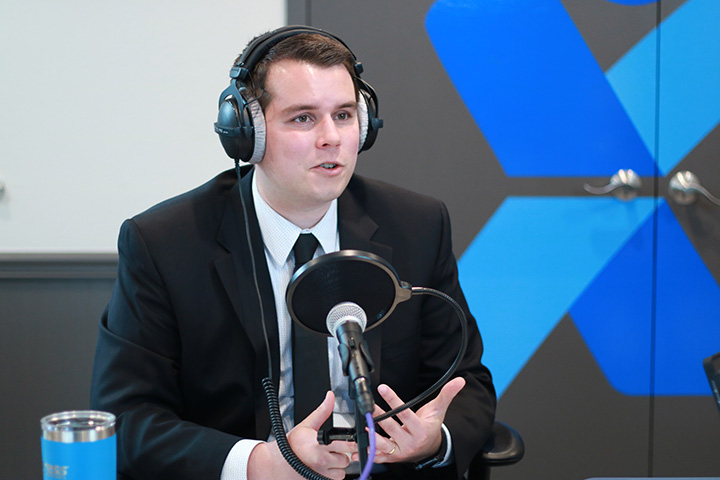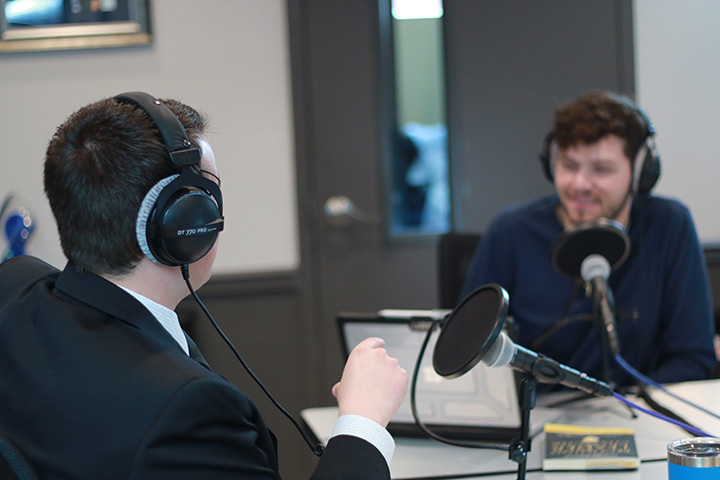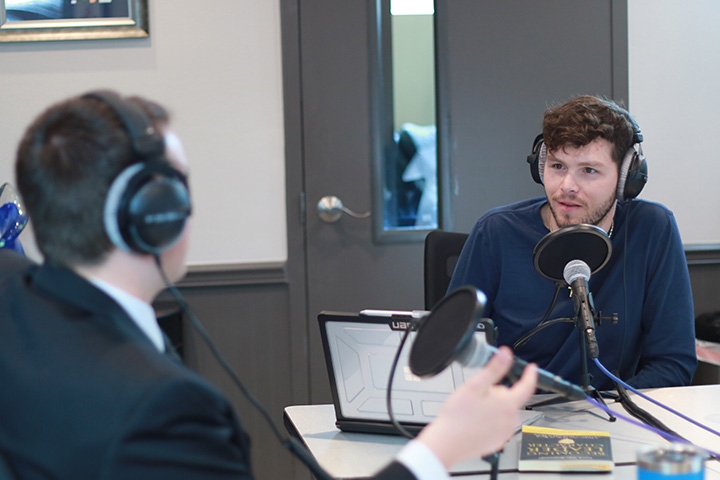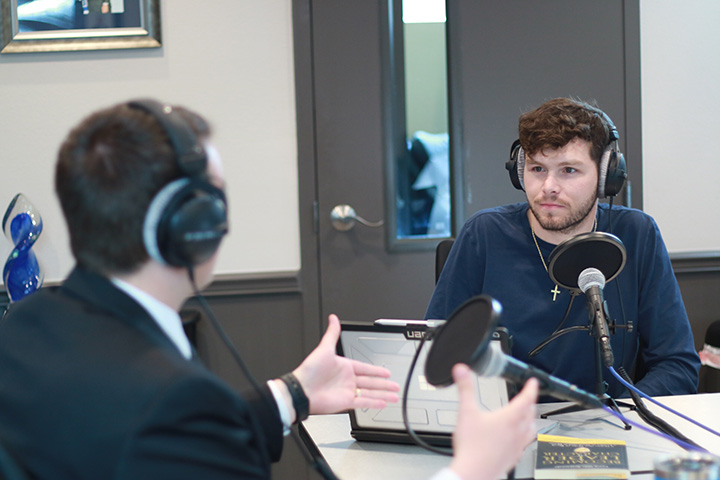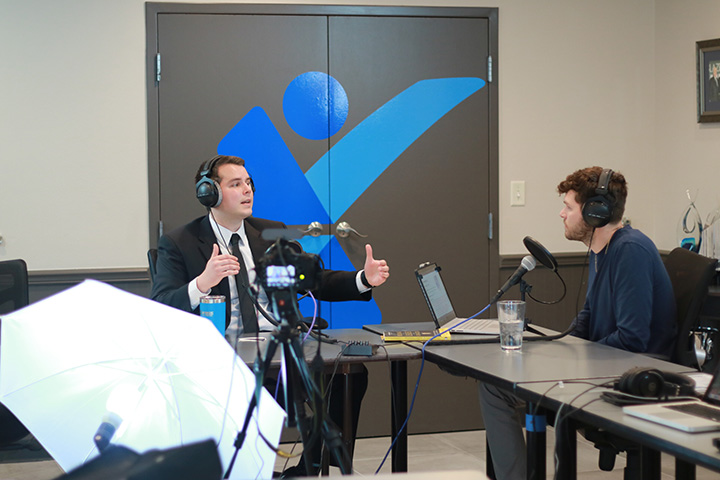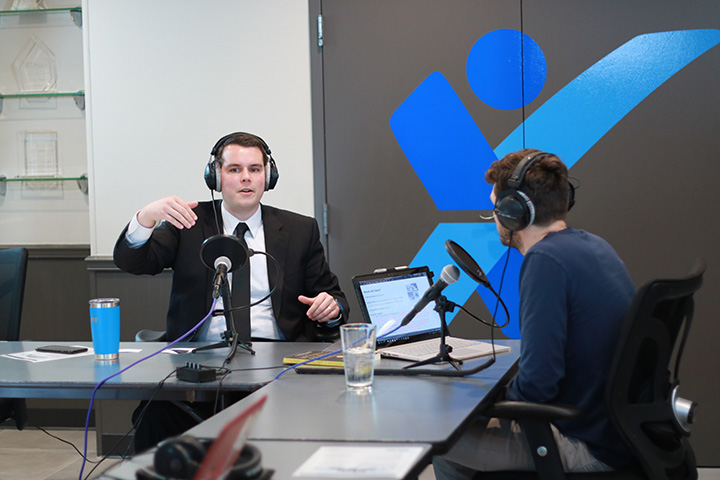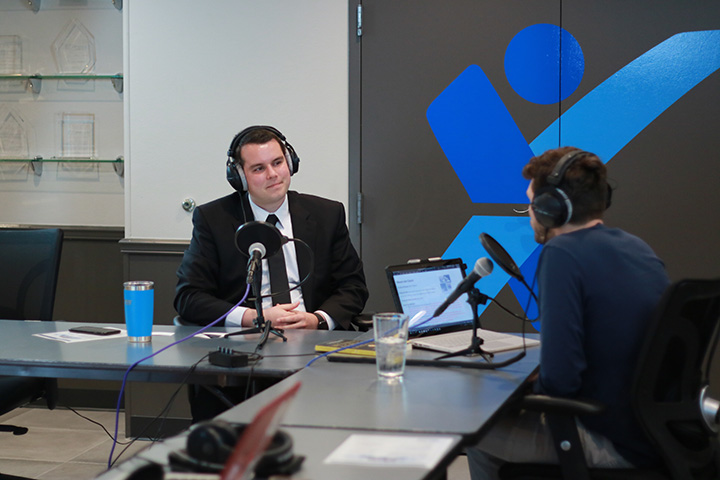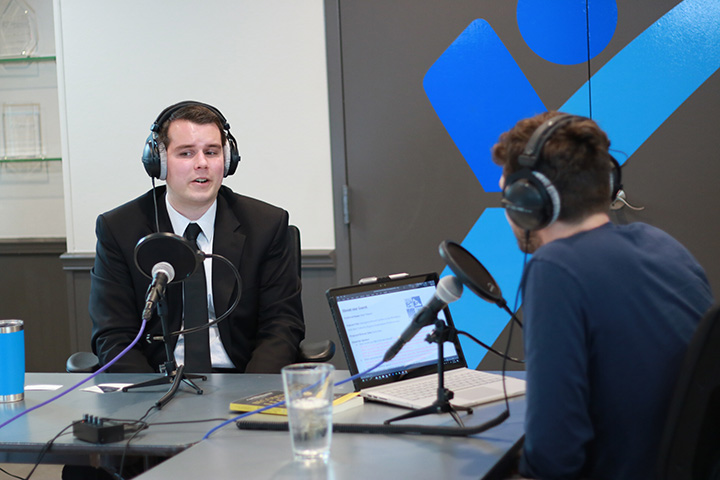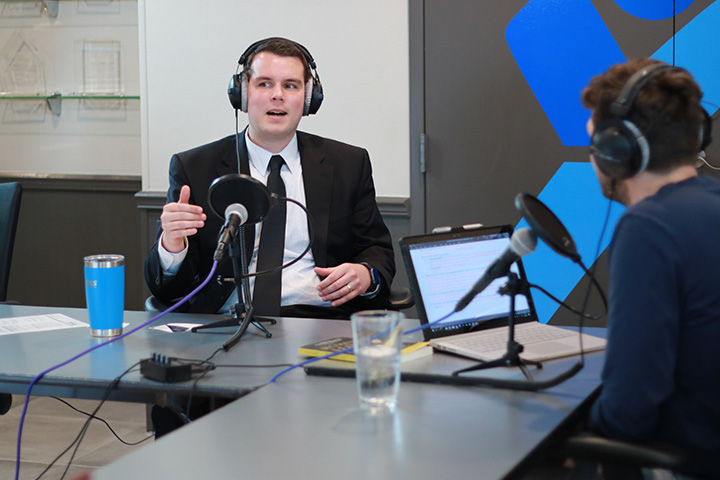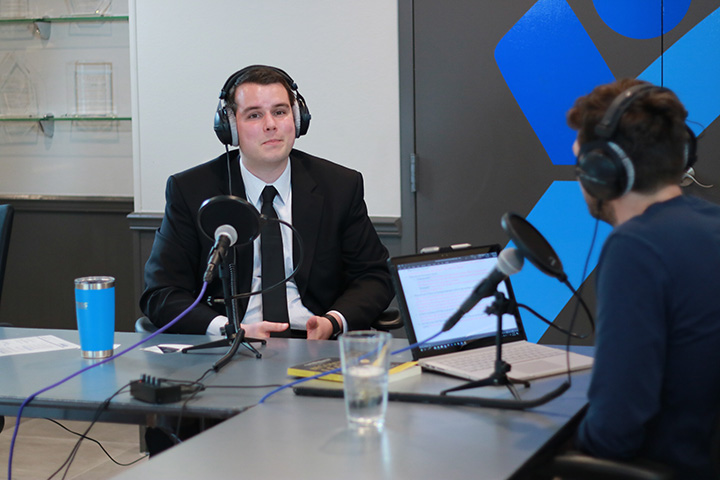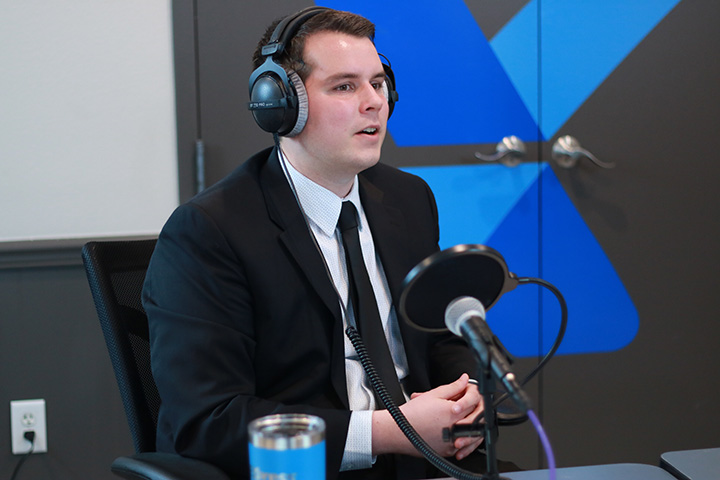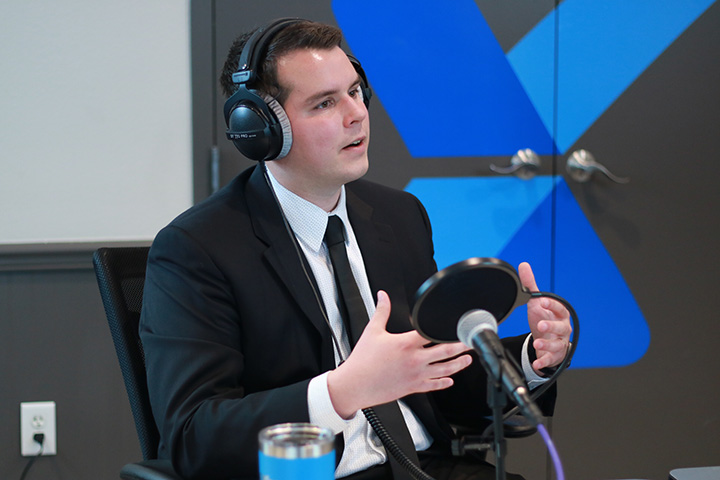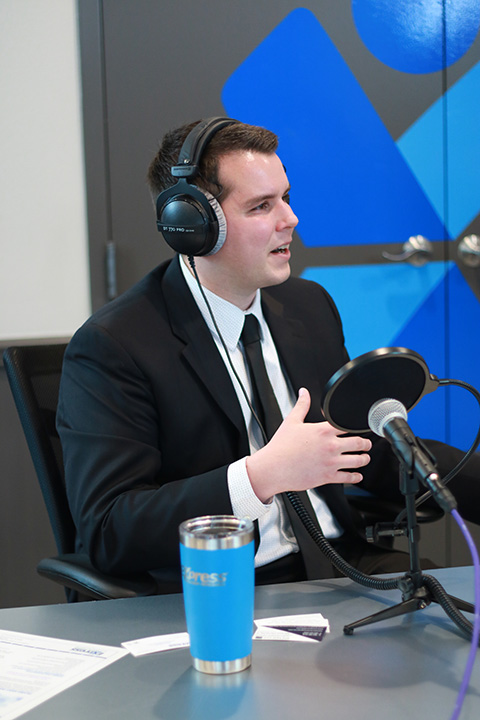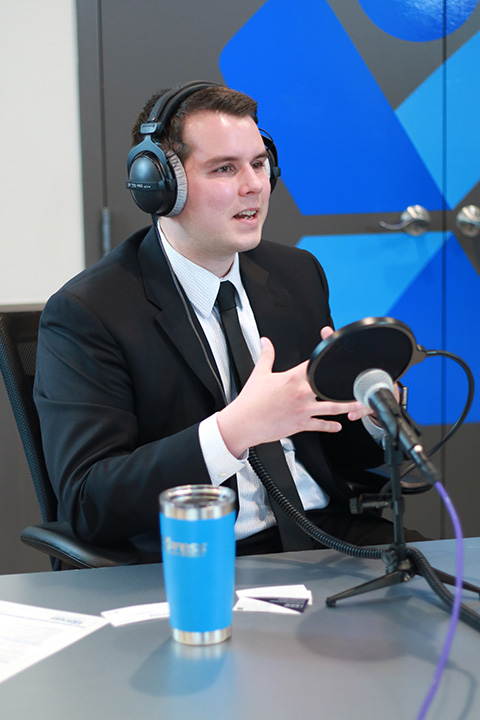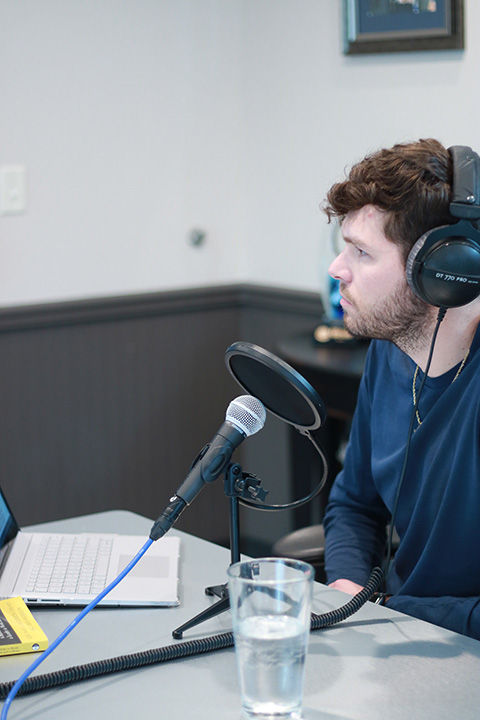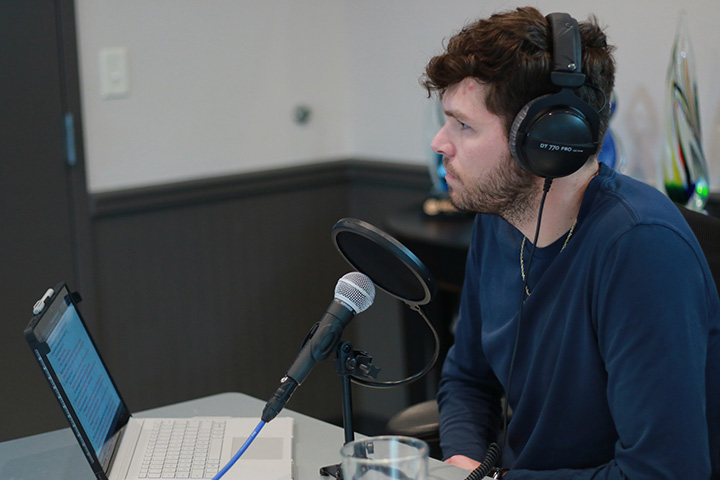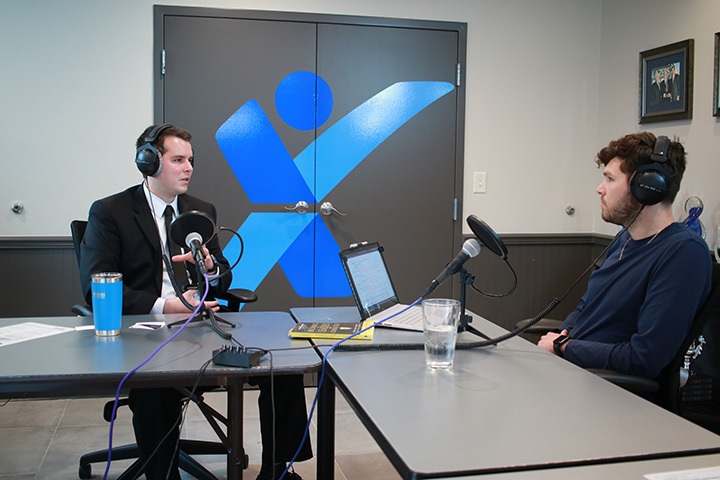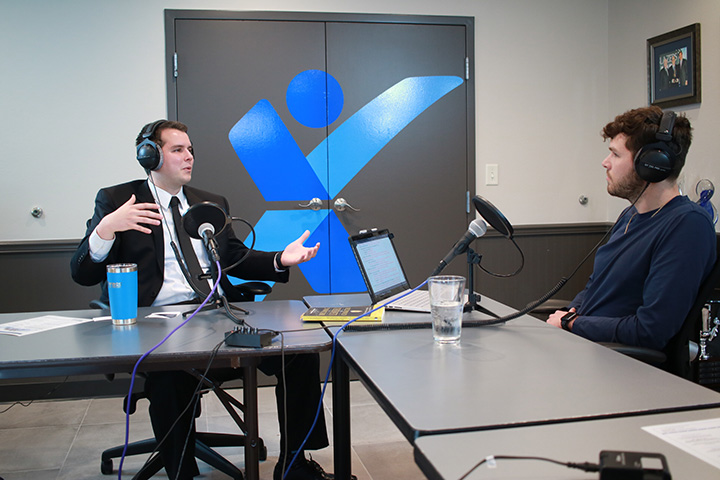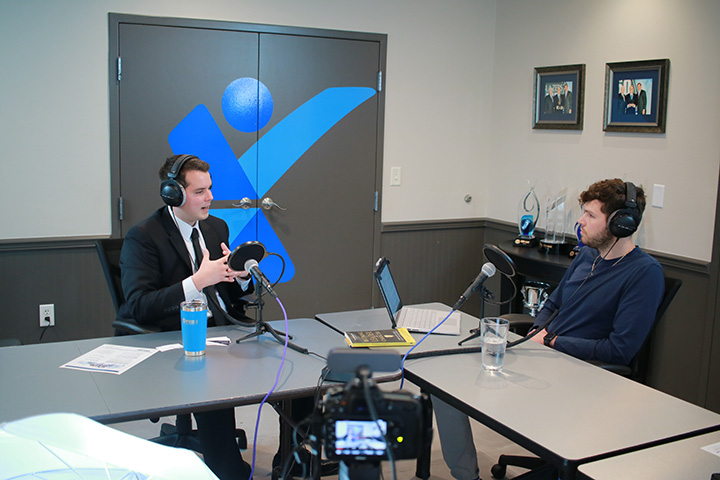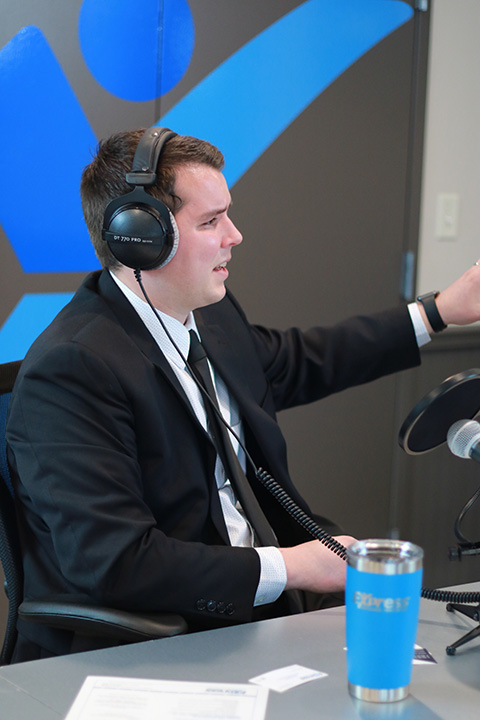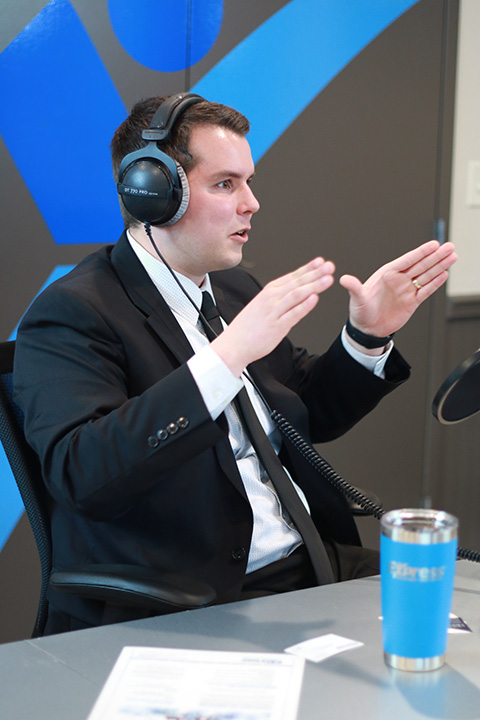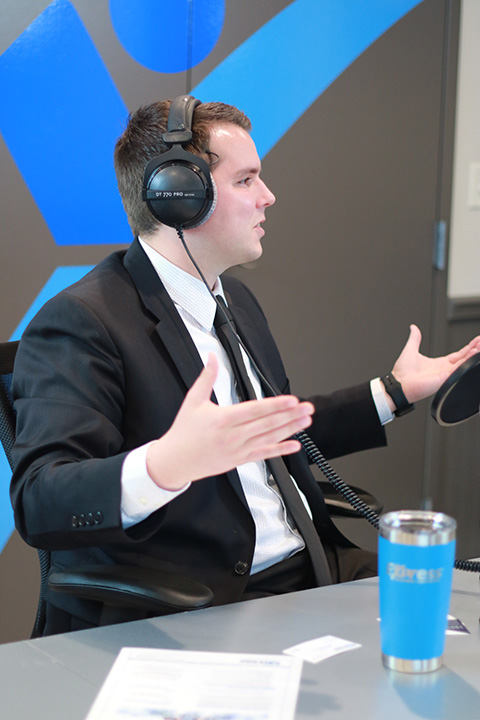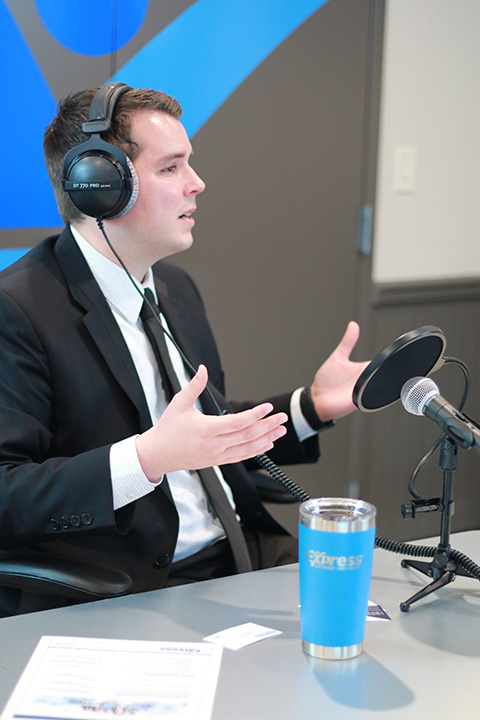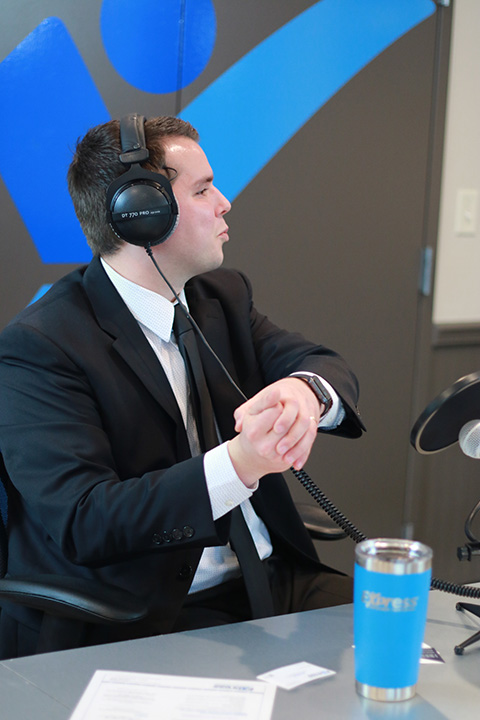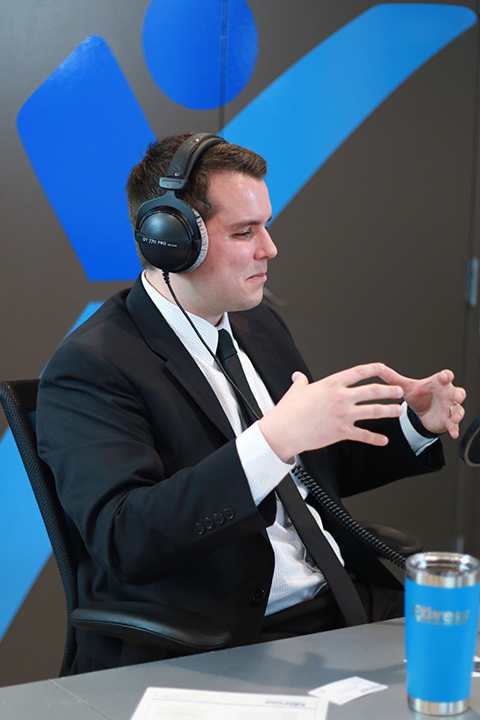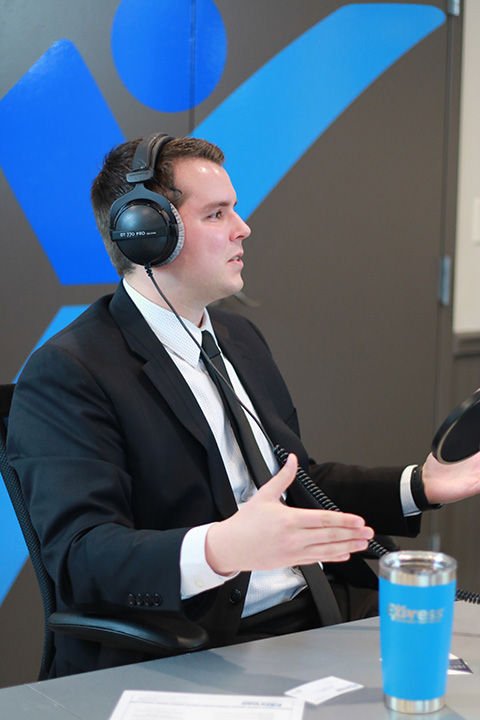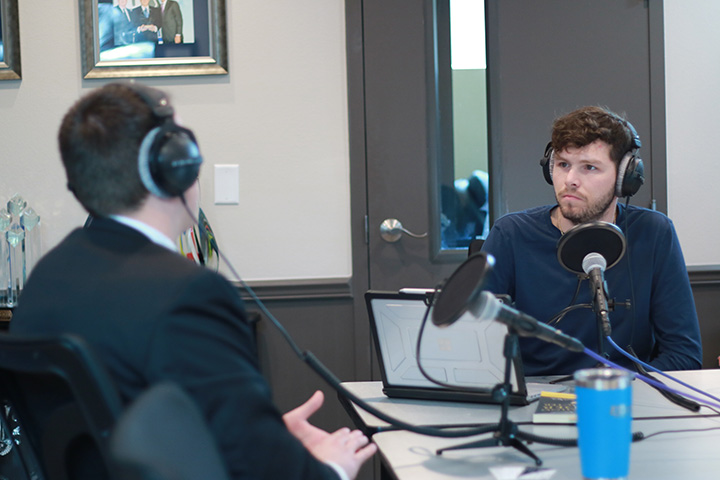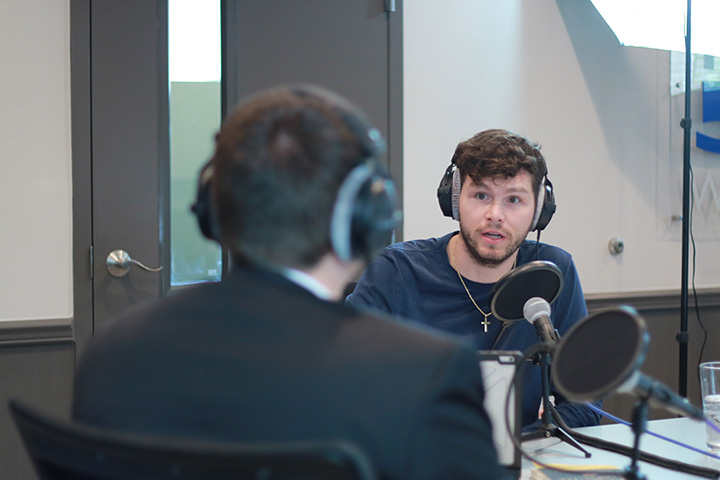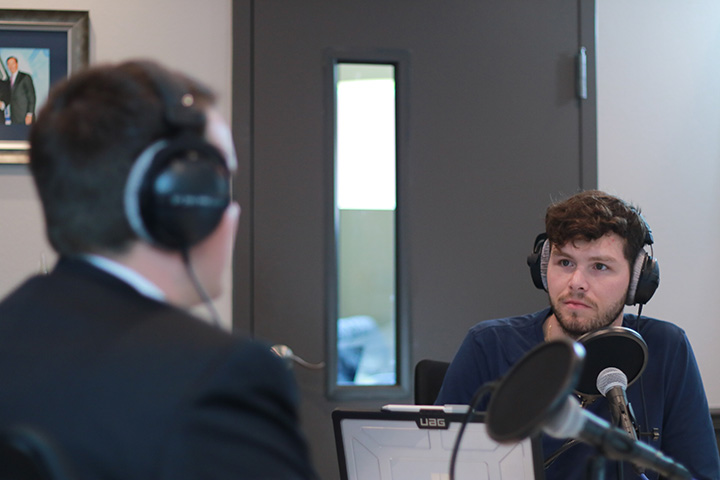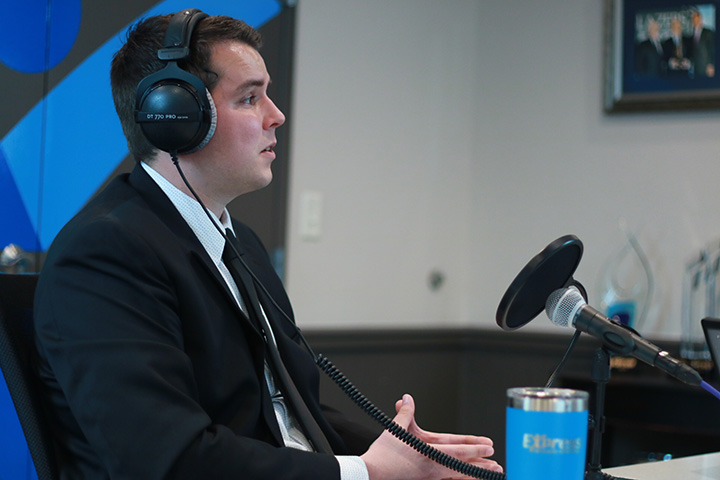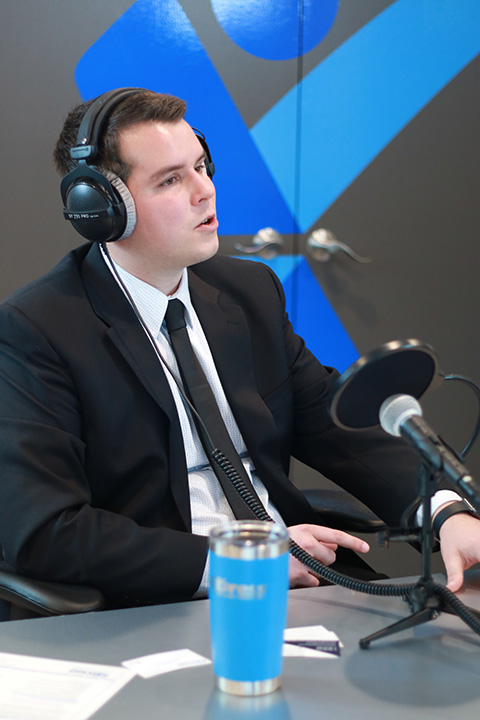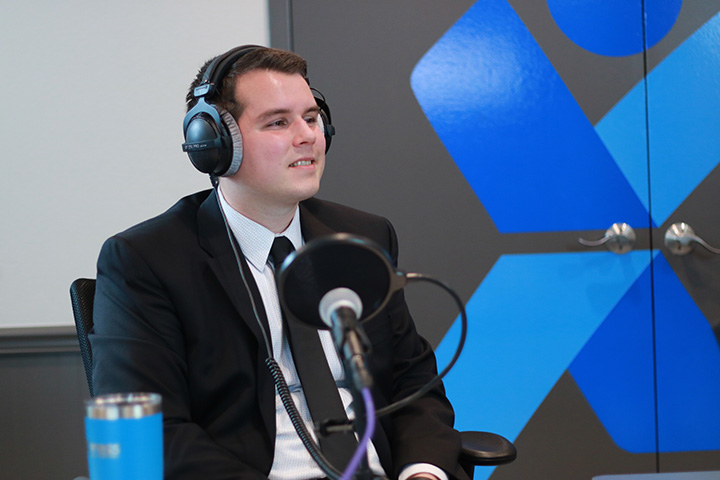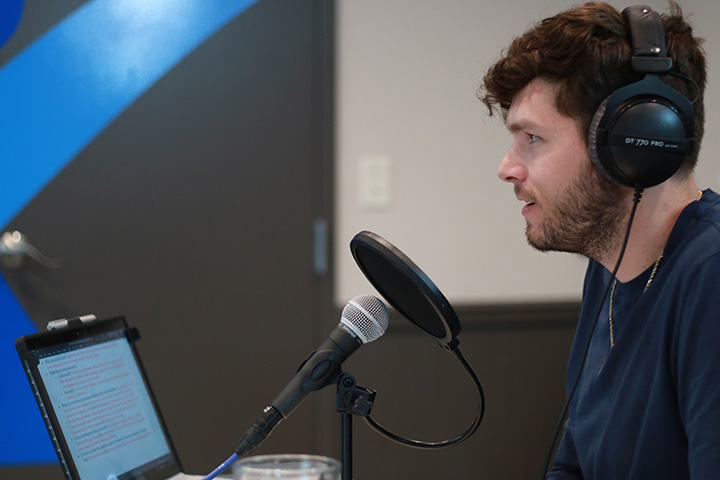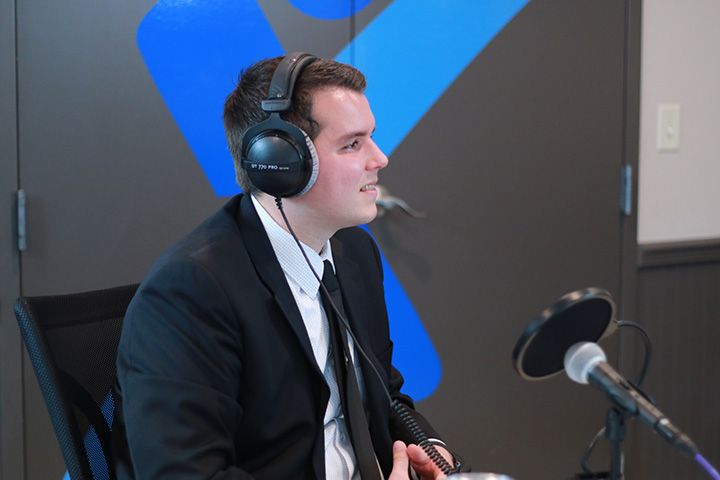Energy Weldfab's Michael Clements sits down with Matt Tibbetts from Express Employment Professionals to discuss the benefits and challenges each generation brings to the workplace. They also discuss what it means for a company to be millennial-friendly and why some in generations 'live to work' and others 'work to live.'
Show Episode Transcript
Manufacturing Leadership
Generations in the Workplace with Matt Tibbetts
Intro:Welcome to manufacturing leadership, a podcast for young professionals in and out of the oil and gas industry. And now here's your host, Energy WeldFab's Michael Clements.
Michael C.: Hello listeners, welcome to manufacturing leadership I'm your host Michael Clements, and I'm here today with Matt Tibbets of express Employment Professionals. He's been with them for three and a half years and he's taught on intergenerational conflict for the past three years, this is an often requested topic by chambers of commerce and other community organizations.
Matt grew up in Thailand and has been speaking training and developing for the past five years, he's been in Texas now for nine years and considers at home. How you doing today Matt?
Matt Tibbetts: Man living the dream, glad to be here.
Michael C.: Well it's a wonderful opportunity to have you on the show, and really appreciate the hospitality in you hosting us here in Tyler at your offices here at Express.
Matt Tibbetts: Glad to have you my friend.
Michael C.: Well we're going to be talking today about intergenerational conflict, and this has been a topic as mentioned earlier you've spoken on a couple of times, so looking forward to this conversation I think this is something that may hit home with some of our listeners too.
Matt Tibbetts: Thank you.
Michael C.: So getting into your background a little bit, you spent some time in Thailand huh?
Matt Tibbetts: I did yes, I grew up in Thailand I was there for nine years, I actually was born in Minnesota of all places, lived in Pennsylvania for nine years ended up in Thailand for nine years and then Texas for nine, so consider myself a third Texan got here as quick as I could you all. But yes Thailand was an awesome adventure, I think that it also helped give me a unique perspective on the American culture, even coming back in high school I was confused why kids that wore moose and had Abercrombie on their shirts hung out together or kids aware that wear Zoomies hung out together.
And I was very much of a third party to American culture, I was even confused by denominations and why churches had so many different denominations and thought processes and theologies and philosophies about the Christian faith, whereas in Thailand there's just kind of one faith. And so it's been interesting, it's been fun to have that perspective and I think that lends itself to our conversation today even on generations having grown up where I did.
Michael C.: Yes, wonderful and after you got back from Thailand, where'd you go to school?
Matt Tibbetts: So I didn't actually take the traditional four-year route, I ended up going to an internship where I did accounting for a year, I did sales in call center for about three, four months, I did leadership, track and then also the executive business coaching track and I was a project manager during that time.
So I had a business coach, we had one-on-one meetings, we read through 20-30 books in the space of that year, and at the end of it I really felt well prepared for the business world.
At that point I didn't feel like I needed a four year degree to take me to the next level, and so I ended up entering straight into the business world, I did training and development for schools all across the state which is kind of ironic having not gone the school route. But being able to communicate, being able to communicate idea doesn't necessarily need a four-year degree, and so figured out that I could do business without it.
Michael C.: Hey that's so true, and is that going to be a common theme here going forward?
Matt Tibbetts: I think so, and actually what we're seeing speaking on our topic generations or seeing with Gen Z, as Gen Z is growing up having seen their older counterparts, their millennial and older brothers and sisters and cousins that are Millennials come out of college with a four-year degree, saddled with debt and not getting a job rather that pays the salary that they were expecting. And so in watching those older counterparts Gen Z is much more pragmatic and practical when it comes to the work space, they're thinking wait a second if I get this bookkeeping certificate that'll make me some good money if I go that route, if I go I certify medical assistant or if I go trades route and get into being a licensed plumber which those guys are hard to find these days.
If we can give trades its respect that it needs and there are plenty of opportunities to make six figures in the trades, if you become skilled at it, become a master carpenter or a woodworker and CDOA driver, they're so needed. And so I think that the next generation specifically is really looking at practical ways on how to get an ROI on their investment in education, now whatever that looks like whether it's a four-year degree that goes towards becoming a doctor or becoming a CPA or lawyer that's absolutely necessary to go through the bachelor's and master's and doctorate programs, or if it's a different route.
And so they're thinking through where do I want to end up, how can I do it cost effectively, and how can I end up in a better financial spot then my millennial counterparts did, and so it's a little bit different approach.
Michael C.: Well if you know how to learn and you know how to read, and you put a lot of value in the books that you're reading and you treat it as though it's a class, like you said twenty to thirty books of some of the best authors, some of the best leadership, some of the best communications I'm sure you read some wonderful books along the way, that has to match an education from some school.
Matt Tibbetts: For sure, and even Malcolm Gladwell he writes in the tipping point that it typically takes about 10,000 hours of focus dedicated practice at a craft to get to expert level, 10,000 hours in a violin to become a master violinist, 10,000 hours before Michael Jordan really took off in the NBA, 10,000 hours before the Beatles drummer became big, big time they were playing in summer festivals for years with no recognition, and then all of a sudden they're an overnight success, no he spent 10,000 hours honing his craft.
And so whatever your craft is sometimes there's a need for education to get their formal education upper, higher education get there sometimes you can do it and alternate it route with the World Wide Web available, and all of the resources on there, there's other ways to get there.
Michael C.: Well with social media it seems everybody is an overnight, but at the end of the day you got to work really hard to be an overnight hit like you said.
Matt Tibbetts: Yes.
Michael C.: Do you think that can be misleading to younger people?
Matt Tibbetts: Absolutely, I think that's a great observation actually. One of my good friends he's made a career in IT and he recently landed with Microsoft, he's making great money working with Microsoft and to a casual observer it almost seems like man he job hopped, he didn't stay anywhere very long and he got to where he wanted to go. What they don't see behind the scenes with this guy is how much time and dedication he put into his business education, and he just got his four-year degree, he was doing it along the way he already had the job.
He got the four-year degree because he wants to build on it with his master's and his MBA to promote up in the company, which that can be a valid reason to get an education or a four-year degree, but along the way which you don't see is that amount of hard work until you get there.
I heard somebody say recently they knew one of the master planners for The Woodlands outside of Houston, and they were unveiling The Woodlands at the time and the master plan behind it and they're like yes thirty years of hard work and it was an overnight success, that's just not true that you just wake up into money and wake up into a great idea.
Michael C.: And with someone who is working hard and working towards those things and says hey I think I may be able to do this, do you think that there's going to be, I guess taking the same route you did, do you think businesses are eventually going to say we're requiring a four-year degree but maybe that's a mistake?
Matt Tibbetts: I think it is a mistake to require a four-year degree; I always appreciate when I see on a job posting four-year degrees or equivalent experience, because there's talent that has not gone to four-year degree route. I think also Millennials and Gen Z in 2016 Millennials became the largest demographic in the workforce, they surpassed baby boomers and Xers, they're the largest demographic of people that are available to be hired right now, people that are working and they're working their way up into supervisory and management positions that have been previously held on to by Xers and boomers.
So with a millennial mindset when it comes to education and where it got them, I think that they're more open to the idea that they can hire someone who can get the job done, and not necessarily has the education behind them. Because they also know of people that got the education and isn't very business savvy, or isn't a very good worker. And so it doesn't necessarily define someone as it may have 30-40 years ago before the dawn of the Internet and the information age that we're in today, but to get information you had to go through the education route, it really said a lot about someone to go through it.
I'm not saying that it doesn't, people that have gotten four-year degrees have spent the dedication and the work to get their four-year degrees and that makes sense. I think that allow other people that haven't taken that route to explain how they've gotten to where they are, allow them to tell their story about the work they've put in, they may have put in equal work without going to a formal institution.
Michael C.: It can be so motivating to a younger person if they know there's another route, a lot of people think hey there's only one route, there's only one way I can go, there's only one way I can do this that's misleading.
And so you don't want to shut somebody out or someone even shut them self-down who has a lot of talent, who says well I didn't go to a four-year school, maybe now I've graduated high school, it's been a few years later, so I want to go back to school to get that degree. How much does work experience play into that?
Matt Tibbetts: I think it's huge, I think it's critical honestly. So right now in our current environment the average turnover in the United States is somewhere around a year and a half, year and a half to two years depending on who you read. And so a millennial or any generation for that matter that sticks with a job for more than two years beats the national average, you go to three and four years, you double the national average and you're setting yourself up for success and so why is that important? Well when you start with the job and you're anticipating to leave when it gets hard, you're never going to overcome adversity, you're never going to get over the wall, you're never going to get through the wall or under the wall, around the wall that you're inevitably going to hit in every single job.
And so what it proves to me when people job hop every six months is that they simply can't get through adversity I don't want to hire them here, because there's going to be adversity, they're going to leave the first time things get hard. But when people stay three, four or five years, it starts to prove to me man they can stick with something and finish it. Similar to the concept of someone finishing a college degree, it gives you a sense of their stick-to-itiveness if that's a word I'll just coin it right now, but gives you a sense of their persistence and resilience to go through adversity and it changes something about someone, it develops character and if they've been able to demonstrate that they've grown during that time that's what I want to hear.
I want to hear not so much that you start at your entry-level position and you're still there, I want to hear how did you grow, what did you bring to the table, what did you do for the company that made you more valuable the third year you were there than the first you were there, that's what I want to hear in an interview process. And when people can especially back it up with metrics I help my team grow by 50 percent over that time period, or our sales went up ten thousand dollars a year the time that I was there or I was in operations and I helped our efficiency speed up or I introduced a concept that's what I want to hear from people.
And so if you can have those stories you can justify why you're great for a position, if you're growing and developing. So it doesn't matter what job you're in right now, whether you are in a fast-food position or you're in a retail position or you're in a position with a company that you don't see a huge future at, show me how you're growing there that's what I want to know, and that's why I may want to hire you for our company.
Michael C.: So for someone that has been in the workforce say 20-30 years, has a degree, has a lot of experience and then they see someone come in who maybe just has the experience but knocked it out of the park and the interview, shows a lot of promise, but maybe doesn't have the education or the experience they have but next thing you know they're working beside each other. What's that looking like these days?
Matt Tibbetts: So that is very typical of modern-day America, generations working alongside of each other. So right now we have three main generations in the workplace, we have baby boomers, we have Xers and we have Millennials, in the talk that I give on generations in the workplace what I always like to say is there's a key catch phrase for each of them. Baby boomers live to work, Xers desire work/life balance and Millennials work to live, it's a 180 degree flop from baby boomers, and the pendulum has swung from work being my sole interest and I lived to work as an identity, Baby boomers tend it.
If you want to diss a baby boomer or you want to call them out say something about their career, about their experience because that's what they live for so far, that's been part of their identity. You introduce yourself to a baby boomer they say I'm Matt and I'm with Express, I've been a staffing for three years they very identify with what they've been doing. A millennial is going to tell you what they love to do, I'm Matt, I love to play Ultimate Frisbee, I love to go to Orange every fitness, I love hanging out with friends and so that's who Matt is and so I work to live, well how does work support my lifestyle?
So back to your question I kind of set that stage, so that when a baby boomer and a millennial are working next to each other, so this new millennial gets hired and the baby boomer has the experience, the worst thing a millennial can do is say to the baby boomer your experience doesn't count, here's a better way to do it, that burns a bridge faster than anything I've ever seen. What a millennial can do well is give credit to a baby boomers experience and say, man that's awesome that you have 20 years of experience, tell me how I can learn from you, build the bridge, build the deposits, Baby Boomers recognize that in a millennial when they're sharing with you that they can't wait to go play Ultimate Frisbee this weekend, that's why they work.
They work to live, they work for the things that support their lifestyle, and they work for that trip that they're going to go on. And so don't discourage that conversation, recognize that as a positive motivational factor, you want Matt to get working get them talking about the trip he's doing this summer to Miami. Oh man I can't wait to tell you about that, I'm going to continue working hard so I can support going on that trip with my wife. And so it's a different approach, Millennials needs to approach a baby boomer, recognize their experience and giving them credit for their experience, and not to say the baby boomers don't have things that they work to live for as well, and these are generalizations.
So never ever corner someone into you're a millennial you have to act this way, they're broad strokes and they come from parenting and values that handed down, Millennials parents were Xers work-life balance people. Parents that were helicopter parents at every ball game, every recital saying step up to the plate and swing, even if you miss you still get a trophy and that kind of mentality was very much in the Xer parenting generation. So Millennials come on the scene with this tremendous sense of self confidence, I can do anything I put my mind to, I can step up to the plate and swing, I can do that recital, I can get that part and have that sense of self confidence.
The problem with that is that self-confidence misguided is arrogance and so Millennials have to reel that in, learn a little humility on the job, give credit to other people and not just think that the smartest person in the room every time they walk in, self-confidence needs to be guided correctly and brought with humility and tempered with that humility to say you know what I have some ideas I'd love to share if I have the opportunity, but don't barge in saying I've got the best next greatest thing and just burn relationships with people of other generations been working a lot harder than you have for a lot longer.
And so it's understanding each other and giving each other space to assume the best of someone else, and assume the best of their generation where they're coming from, how they're raised so it makes a big difference in the workplace when you take that time to say you know what Matt was being a millennial today, you know what Jack was being a baby boomer today it's going to be okay. You know we would work through this, maybe we can have a conversation about that conversation and work it out, but we're adults so we can do that, but assume the best of hey where we coming with it on that comment, I didn't understand it kind of hit me the wrong way.
Michael C.: You see Millennials one thing I've noticed it's hard, I look at a lot of applications, it does seem it's hard for a millennial to stay in a position longer than a year or two years. Do you ever see them being like is this generation going to be able to stay in a job for 20 years, 25 years and you know get the retirement party that you see a lot of baby boomers and people get, is that going to happen for the Millennial or is it going to be two years here two years here, two years there, what's it going to look like here over the next decade?
Matt Tibbetts: Yes, man I think there's a lot to unpack in that question. Seth Godin recently said that the idea and concept of a company staying the same way it is and staying operating in the same way for the next hundred years is a really sweet nice idea, but it's not practical in today's age. Change must be a core value of every company, they must be able to pivot and change and introduce things, and so as change occurs people's positions that once fit a company may no longer fit.
So it may not always be the Millennials fault for leaving, it may be that this company rearranged and you know what technology sped up to the point where I don't need this position, whatever the case may be there's going to be change coming. So the concept of someone staying somewhere for 20 years I don't think that it's not there, I think it could still happen, part of it one of the biggest things Millennials look for in a workplace is mentoring, who is my mentor.
And I have a millennial friend for instance, he was a executive team lead at Target and he talked to rocky our owner here at Express and said Rocky how long do you think I should stay here, like how long should I stay at Target and he said Matt year-and-a-half is the average turnover, stay at least three years you'll double the national average and guess what Matt did he stayed for three years, and then he found another job that supported his lifestyle more. But he worked weekends, he worked thanksgiving, he worked Christmas, he worked all the holidays, he worked overtime, he worked nights, he worked like a dog for those three years because he knew in his mind the mentoring conversation was going to pay off for him.
So companies that can offer better mentorship, the statistics are that companies with a mentorship program have 72% better retention, a lot of places that we see that done really well or CPA firms, Attorneys offices when you get a fresh attorney in or you get a fresh accountant in and they pair up with an older CPA or an older attorney and say hey you're going to be mentor buddies, I'm going to help you get there you keep that person, that person feels valued and invested in, that person could be a 20-year career employee for you if you invest in that mentoring. But if we don't have that conversation and don't think about asking the question, hey Michael where do you see yourself in five years, where do you see yourself in ten years, how can I help you get there, let me walk you along with that we're going to lose people.
And so I think that for Millennials and for even just a culture as it is now, they access to information and available jobs and even in the way that unemployment is at three point four percent in Smith County, if you have talent that you're not taking care of talents going to start looking and there's plenty of places to look, they can jump on Google today go to Google jobs, go to Indeed, go to Monster go to anywhere and they can start looking for the next opportunity and towns going to walk out the door.
So you have to treat your internal staff as good as you treat your customers, you've got to give them great customer service if you want to keep them, retention isn't a given but retention will pay for itself if you invest in it. And so that's a huge competitive advantage to keep your people for a long time, to beat those national averages, to spend money on culture development and spend money having these leadership conversations and on how to keep your people, it'll pay for itself if you're able to keep people longer.
Michael C.: Yes, because from the employers perspective it’s like are we establishing loyalty, are millennials going to be loyal? I do believe Millennials are loyal, I've worked around them and I've worked around some that if you weren't keeping them interested then it was hard to keep them motivated. But I've worked around others that there really wasn't much difference in working with them or the baby boomer or the person that I worked with before.
So I think that there are a lot of perceptions out there, a lot of stereotypes but at the end of the day I think everybody wants to work hard and you mentioned it's for different reasons. But at the end of the day this is the generation we're living in, this is the folks that we're learning, but whenever here in a decade Millennials are likely to be with companies for 10 years, give it some time.
Matt Tibbetts: That's right. And I think to your point every generation has a learning curve when they get into the workforce, and so for instance baby boomers today are known as the great generation right, they're the ones that have carried this country on their backs. You know what they were called when they first entered into the workforce after traditionalists, they were called The Lost Generation, you know what traditionalists said about baby boomers these kids don't know how to work, sounds familiar.
And so every generation goes through a curve where there's a maturity level that comes up, and you can find mature Millennials just as well as you can find immature Millennials, just as easily as you can find immature Xers and boomers and mature Xers and boomers. So maturity spans generations that's an issue in itself, but generational traits is what we're talking about as far as difference in value systems, one thing that makes a big difference for Millennials is they want to do work that counts, they want to do work that matters and so companies need to be very good about communicating their why, why do they exist?
Simon Sinek wrote a book on it start with why, and if companies can communicate here's why we exist is not to just make money, it's not just greed and profit and bottom line, is we exist for a noble cause, we exist to support businesses in the oil and gas sector, we exist to support people's jobs and livelihoods, we exists because we love helping people and we love seeing them succeed in employment and we love seeing companies grow, that's why we exist at Express because we get to help companies find good people and good people find jobs.
So if you can tie people into their why and why you exist you end up keeping people, and I've talked to a lot of volunteer coordinators who have done this session for a number of nonprofits, and they say that the two biggest groups of volunteer right now are Baby Boomers and Millennials. Millennials love causes, they love tying into something and Dave Ramsey would say too on his show, he's got 650 employees now, he says there are two kinds of Millennials, two brands of Millennials there's the ones that suck and don't want to work, and there's the ones that will give themselves for a cause and they don't have to make as much money, they don't have to have all the perks but if they can do work that matters, they're there.
And time off is an important concept, so you can balance money with time off if you can give me off on a Friday afternoon I may take a little less money, I may even take it unpaid, if that works for your production schedule, hey you look at flexi that to attract the right people. And so there's variables in our companies I think we can tweak and change, I think it also comes down to having an individual conversation to another millennial I'd rather make the dollar working as many hours as I can. And so just being willing to flex and being willing to make unique arrangements when possible, it's not always possible but when you can you end up attracting good people, you end up keeping good people.
Michael C.: How important do you think it is for Millennials to be honest in their job interviews with an employer about those things?
Matt Tibbetts: So about compensation topics or what?
Michael C.: About what's going to make them happy.
Matt Tibbetts: Yes oh super important, but I think also it's just as important on the employer side of the table to give a honest and open platform to even from millennial to feel comfortable sharing that. Because I think at this point, so the bandwidth of Millennials is that they're all the way from 22 years old up to 36. So you're a 36 year old millennial right now is feeling like gosh I really hate being called a millennial, I hate being called entitled and narcissistic and I always need time off and I'm lazy I don't like that, and I'm 26 and be 27 this summer I don't like that, I don't feel fits the mold of the entitled lazy millennial I get stuff done man.
And so when a millennial brings that conversation up I think we're a little bit weary of our audience, if they think that I'd rather have a week of time off versus money they're going to not think I'm motivated, they're not going to think that I'm driven and that I want to get stuff done. It's not that I don't want to get stuff done, I just want to be able go to Colorado to see my family, I mean they live just south of Denver, Colorado's gorgeous I don't to have plenty of time to go see him. I want to have time to go see my brother when he graduates from the University of Portland in May, I want time to go do stuff I don't necessarily need a lot more money, I just want time to do it and I'll work really hard for you in between this time that I'm off, I just want enough time to go do things.
And so I think being able to establish that baseline of trust is important for an employer, to say that whether you say we're a generational friendly company or a millennial friendly company, how are you bring it about that we encourage you to be honest with us that we want to know what's important to you, and to the best of our ability we will take care of you because we want to not just by your back but by your passion, and I know that that passion is not readily given unless you feel like you're getting what you want out of it.
And so I think that conversation could definitely be there, I think it's important for Millennials to have, I think that we're scared to have it sometimes when we think that we're going to get shut down and lose the job opportunity if we're honest with what we really want.
Michael C.: So speaking on passion you're very passionate about what we're talking about, I'm eating it up. How did you get so passionate about this subject?
Matt Tibbetts: So I started expressed three and a half years ago, and my role was to fit administrative recruits with the right company, the right companies with the right ministry recruit. As we started talking to companies, one of the pieces of feedback that we'd hear from because we work with over 2000 companies in the area is man we are having issues with intergenerational conflict. A recent Sherm survey said that 72% of respondents had issues with intergenerational conflict, so it's not just local it's national thing.
And so as we hear that feedback from different companies, one of the things we love to do at Express is come up with training and development programs that answers that need. And so Express came out with faces of change, managing and communicating with generations the workplace, understanding managing generations in the workplace. And so I love speaking, I love speaking and training, so I hopped right on I said I could definitely do that, I'll be the token millennial I'll throw myself under the bus and we can be little snowflakes and we'll talk about it and so it was just super fun.
So I started doing it to get started with three years ago and just never stopped, I never stopped getting requests for it, and so it's been really fun, I've listened to a lot of podcasts on it and it's just kind of snowballed. And also really my true underlying passion underneath generations is communicating and articulating ideas, I love to share information with people that helps change and helps people grow and helps people become inspired.
My favorite thing is getting to teach a room, teach a class or a room or a group of people and seem like come on in their eyes at the end of it and go aha, I understand something a little different than when I walked in an hour ago or whatever the timeframe is. And so this is just one of them that feel privileged to get to communicate, and it's a blast.
Michael C.: That's great. As you do these speeches are you looking at doing this outside of express?
Matt Tibbetts: So I think what I see is being able to carry the banner of express wherever I go in this session, being able to share it with local chambers of commerce, I'm going up to Sherman here a little bit to do a talk on onboarding for greater retention, that's another fun topic.
And so within I think probably more so within the context of, within the banner of being employment professionals and getting to share messages that help in the space of employment that's where I really see these topics being utilized the best.
Michael C.: It sounds like you've learned a lot and also our listeners and myself we all have a lot to learn from you on this subject, and what you're passionate about, but also personally what are you passionate about?
Matt Tibbetts: Man where do I start, I'm passionate about my faith in God and seeing the gospel of Jesus go to the ends of the earth. My parents were missionaries and so that that fires me up to be able to ascend on missions, and be able to support missions. One of my best friends lives in Jerusalem and Israel and he's started a ministry there, and so that's incredible we support missionaries in Iraq that are just on the other side of the lines of soldiers running around it's crazy.
So that's a huge passion for me, I'm definitely very passionate about our church in our community that we have here and the other day I just really thankful that I feel like God's placing me just a love for people, really love connecting with people whether it be one-on-one doing Bible studies of people etc.
And then also just I love sports, I love competing so Ultimate Frisbee for real I play every Sunday, and that comes from my dad we always played sports growing up, shot hoops, played football even this may we're actually going to Portland for my brother's graduation he's like I'm bringing the football, we'll play some two-on-two and we always played two on two with my brothers and my dad and so yes that's some of my passions.
Michael C.: That's great. I think that's wonderful what you're saying about want to see the kingdom of God stretch out, that's one of the things that we've talked about on the show with past guests and exciting to hear that about you and I can tell the Lord's working to you the Lord's has some great plans for you in your life, so that's absolutely wonderful.
Back on intergenerational conflict in the workplace, like what potential issues does a mixed generation workforce face?
Matt Tibbetts: We're never going to not have inter-generations in a workplace, there's never going to be a point in time where they're just all Gen alpha or whatever is next after Gen Z, I'm suppose we've got a reset at some point and start over on the alphabet. But so there's always going to be the opportunity for people to make poor assumptions of the person next to them, and there's always going to be an opportunity for people to make good assumptions about the person next to them.
I think assuming the best in people is a good core value underneath this discussion, that I'm going to assume the best about this next generation coming up, I'm going to assume the best about Gen Z that are eating Tide Pods right now and whatever else. And so I'm going to assume the best about them when they get to work, I'm going to assume the best about my Xer counterpart and my baby boomer counterpart at work, and let's see how we can work together the best.
And so it comes down to communication, it comes down to having conversations at time to say Matt when you said that it kind of ruffled my feathers a little bit, can you explain yourself a little bit more or Michael when you said that that kind of hurt my feelings and this is kind of how I perceived it, is that what you meant and be able to hash behind closed doors and just having that fierce conversation and that fierce feedback I did borrow a term on here's how I fell in that conversation.
And so intergenerational conflict it's going to happen because our parenting values change and our culture changes, and so the key is to assume the best about someone, have a conversation about it, work together a little better moving forward.
Michael C.: So it sounds like there are a few things leaders can do in their organizations to help work through that, so it sounds like openness is one of them and just good communication?
Matt Tibbetts: Absolutely, and I think too recognizing, I think leaders have to recognize that the largest demographic in the workforce, I keep saying this that the largest demographic in the workforce are Millennials right now. So if you're not a millennial minded company, if you're not focusing on this next generation this can be your next generation of leaders, supervisors and managers then is your company going to terminate on you, you can't just keep hiring people the same age as yourself, they're not going to be available anymore they're going to retire.
And so every generation goes through that process of thinking through their transition plan or developing their next leader in the company, and so it's something that traditionalists had to do for them and it goes on, so it's something that every person learns as they go through their lives as succession plans start to come to play. So I think I answered your question, but I may have gotten on a rabbit trail there.
Michael C.: What can leaders be doing in their organization to encourage that problems don't occur?
Matt Tibbetts: That's a great question; I think talking about it is a great start. I think that it starts the communication, being able to have a conversation about generation in the workplace, get a book, get a PowerPoint, come to a Lunch and Learn, come to something to where you can start to identify and we make fun of it on our teams. We say oh man that was a really millennial comment or that was a Gen Xer comment or that was a baby-boomer comment. We also utilize personality types a lot so we use the disc assessment, which is an acronym for DISC, some people use Myers-Briggs the INFJs and ENTJ's and different things.
And so utilizing those in your conversation helps give you another level of intelligence in your conversation, so it's not just oh well he acts that way, it starts to become oh well my teammate Kelly she's a high D on the disc assessment which means she's a task pointing a person, she's a driver she'll get things done, she's the kind of person if you want something done you give it to Kelly. Matt is a high I which means he's a high people person, people oriented person, so Matt's feelings get hurt real easy when Kelly walks in the room says Matt I need this done and she walks back down and go huh, she didn't talk to me.
And then Kelly gets frustrated with Matt when Matt comes up and is just talking about the world and life what's going on this week, and she's like get to the point. And so we get to laugh at ourselves now, but initially that created conflict not because of generations because of personality differences. And so once we were able to talk about it we had some closed doors discussions saying hey when you say this it kind of hurt my feelings, and when you say that you're being a little too sensitive and we hashed it out and we came back together and now we're great coworkers, I feel like we work together really well.
She would say the same thing, she's said it before that before we had some friction and now we work together really well. And so to answer your question what can leaders do to discourage conflict and intergenerational conflict and encourage healthy communication, I think having a conversation, we have different generations it's a reality our generational values tend to be different let's talk about that.
I think utilizing personalities is another layer in that is also a really great part of the conversation. Generations is only one part of the puzzle piece, so I don't want people to think you figure out generations you figure it out at all, it's a piece of the discussion but I think it's worth having and I think you'll see better communication as a result.
Michael C.: It sounds like leaders do not need a shy away from the conversation in the workplace?
Matt Tibbetts: No, not at all and it doesn't have to be an age discriminatory thing at all, I don't even really talk about ages in the discussion. I don't say if you're 65 years old you tend to act like this, that doesn't have any part to play. My teammate who's technically a millennial in the years that she was born, she acts very much more like an Xer because her parents were baby boomers, and so it comes down to parenting values and traits. But when you can build trust on the team because you start to understand how your teammates operate that may be different from each other that are worth something.
So when you can build that trust to say oh she was raised by baby boomers, and she acts like an Xer, I understand a little bit more about her then you can move at the speed of trust, and communicate at the speed of trust and so it just helps the discussion, ease the discussion.
Michael C.: With working with Millennials, and in cross generation, how much is technology playing into the conflict in the workplace at times?
Matt Tibbetts: So I'm going to dive after what I think you're going after as far as cell phones in the workplace and people being glued to their phones all day long and that sort of thing, so I think a concept that I landed on recently about technology is that technology was originally designed to bring people together, and when it anything but that it's not being used correctly. And so here's an example, in the staffing world there are digital staffing firms that are only using technology to interview, screen and source people for your company, and we don't believe in that in express. We believe that people are unique, that it takes high-touch, that it takes meeting somebody knowing their culture, meeting with the kneecap to kneecap to make you good hire.
And so we utilize technology to bring us together to say okay you can find out about us on an app, but I want you to walk in the door and meet me and shake my hand and look in your eyes and find out who you are. And so when it comes to technology in the workplace that's the very conversation I would have, so if you're texting in a meeting are you not disregarding the people that are right in front of you, are you not using technology to divide relationships rather than bring them together, that text can wait. And whether it be a policy that every leader leaves their cell phone in a bucket when they go into a meeting, or it's check your phone every once in a while or every couple hours or whatever the case may be, I think it's a worthy discussion to have, I think it's a discussion that we have here at Express, it can impede your production.
And it can be a safety hazard in certain environments and manufacturing, and it could be huge safety concerns if somebody's head down on a phone and they're walking through a plant. And so it's a discussion that needs to be had for sure, and I think that the generation that's raised on screens is going to be more prone to be on their screen all the time. IPhones came out just ten years ago and now Gen Zers are growing up in a day and age where they don't remember technology before it was here, and so for them if I'm trying to FaceTime you and it doesn't work then this thing is broken, it's not that the technology's not there this thing is broken.
Their baseline for technology is that I ought to be able to pull up your face on my device anywhere in the world at any time, and if I can't broken. Whereas ten years ago that was impossible, we had BlackBerry's, we weren't facetiming on blackberries or Face Timing on the first iPhones. And so the baseline of technology has moved way up, and so we do have to have different discussions about it, we have to have different parenting discussions about it, there's a lot of data coming out now that we've had iPhones out for ten years, how destructive it can be for kids that be on digital phones and devices all the time.
One of the podcast I listened to recently he's a dad and his daughters like a teenager like 12 or 13 tweener, and she came downstairs crying one morning because she was so overwhelmed by the amount of text message she had got last night. She had gotten 600 text messages in the course of her sleeping in bed, with all of her tween friend’s just texting back and forth on a group message and she couldn't keep up with all of them that are the world that our kids are living in that we didn't grow up in. And so we have to have a different discussion when that kid walks into the door for your business one day, what are they expecting, that was the world they grew up in and so they're fast paced, moving fast.
If I'm sitting in a job at your company and the next iPhone comes out, and I'm still making the same money in the same position, not doing anything different the world is passing me by, and so how can I make sure that I'm feeling like I have traction, that I'm moving forward so technology kind of plays a part in all of that type discussion and you need to have a conversation again, just enter into the conversation.
Michael C.: Yes, one of the other things with technology and I've seen this in the workplace is, you bring a millennial in and you have somebody 20 years, 30 years’ experience they know exactly what they're doing, they know how they perform their job before they were at that company they were doing that job before or they learned how to do it. And so to see a millennial come in who knows how to work software, you think about a generation that was raised on video games, I mean I've looked at a screen my whole life, I've learned how to hit buttons and it comes simple for me.
So whenever I'm sitting looking at software and my computer freezes up, I don't really freak out, I don't think that everything the world's lost I simply just close it out or ctrl, delete, reset and I think that comes from playing a plan Sega or playing like I'm just thinking like of a Sega Dreamcast.
Matt Tibbetts: Like in 64, PlayStation.
Michael C.: Yes, I could sit there and play a game all day long and then it freezes up on me, I have to take my disk out, blow it off, put it back in and I just lost my whole game, but you know what I'm not going to stop playing video games, I would start right back over and do it all over again.
I think that's a an advantage that the Millennials do have when it comes to software in the workplace, and that if something's not working right you don't look at it like it's broke or it doesn't work or it's never going to work, you just simply take the disc out blow it off and start over again, and you keep going.
Matt Tibbetts: Yes, absolutely.
Michael C.: What do you think about that in the workplace right now, because I've seen that firsthand where you have the 20 year guy and then you have the person beside them, and it's like there's no equivalent there with the experience, but this person actually knows how to do it in the software, do you think that's going to continue?
Matt Tibbetts: Yes, so I think it's a great question. Two thoughts on that, one Dr. Tim Elmore wrote a book called marching off the map and it's about leading this next generation, specifically Gen Z and some Millennials as well. One of the things he said is that we've gone through several ages, we've gone through the Industrial Age, we're now in the Information Age, he said the next age his prediction his words were is that we're going into an intuitive age. And Gen Zer's can intuitively understand technology because technology is being built with them in mind, that when they pick up an iPhone they know how to unlock it, they know how to go to the App Store and download stuff.
I teach this class all the time and grandparents around the room were going oh yes my two-year-old can go find their favorite app unlock it and go do the thing, and there's an article recently where this kid got on a parents iPad in the airport, downloaded $11,000 worth of apps before they left the airport, so they were pretty shocked to get that bill. But it's just intuitive to them like you were saying; I just understand how this works just instinctively.
But to your point as far as the generational gap when it comes to technology, one of the stories that my mentor who is a VP at AT&T Universal car, he says I remembers the day the email came out. I remember the day when we were giving these computer machines and could send emails across the building, so what would happen VP's would have their secretary type up an email, send it to the other secretary, she'd print out the day's emails, hand it to the VP he'd make his notes on it, hand it back to secretary she type it up send it back to the other secretary to print it off and the cycloid continuing.
And he says I remember the day in corporate AT&T history when a memo came out saying you may not print email, you must reply via the supplied machine and that was like groundbreaking. And so for a millennial it's important to understand that in the baby boomers lifetime they have seen technology come leaps and bounds beyond where it ever was when they were a kid, they didn't grow up playing Sega, they didn't grow up with having email access well they couldn't text anybody, but now how many of us have a smartphone in our hands that we can text somebody sometimes before we even email because we can get a quick response.
And so technology has come so far but it's still a value for baby boomers that they are a great person to person, they're great with a firm handshake and warm smiles something that Millennials could stand to learn, that they've grown up on screens and sometimes can't always greet someone very well, can't shake hands, can't make eye contact or smile and so they feel really awkward in that transaction, whereas a baby boomer it's a core value still.
And so Millennials need to understand that to a baby boomer making sure to have a good first impression with a firm handshake and warm smile goes a long way, to baby boomers understand that these kids so to speak, these Millennials that have grown up in a time where they were glued to a screen have a better intuition perhaps into technology. And that's to say the baby boomers can't grasp technology and not to say that Millennials some of them don't know technology again, these are broad strokes they're generalizations, but it does stand to say that there is a difference in how they were raised.
Michael C.: Well and I could see for a leader in an organization if you have a millennial come in to your company, and maybe they don't make the eye contact, maybe they don't shake the hands, maybe they don't do the things, I think a leader could be quick, well maybe not a leader but a manager, could be quick to be turned off to that individual and think well they don't want to be here, they're not interested. Whereas I think a strong leader should take that as an opportunity to teach or mentor or say hey, this is how you shake a hand, this is how you do that.
I was blessed enough to grow up with parents and around other professionals, I mean I was seven years old shaking hands, it just came natural. But I also see a lot of people my own age who that still is something that is very awkward for them, so how can a leader in their organization when they see that, how can they go about teaching?
Matt Tibbetts: Yes, that's really good. I remember hearing one of my leaders growing up tell me Matt you want to succeed in life, you want to separate yourself from the pack and separate yourself from the generation you're in, just do two things show up on time and work hard the entire time you're there, and that advice has served me really well. But I think that a lot of millennials need that feedback, they need that advice, they need that counsel and that wisdom from people, that fatherly advice that perhaps they didn't get and so it's worth having the conversation.
I think it's worth investing in programs and curriculum that teach about soft skills, that we actually a shameless plug we do a curriculum called job genius, it's free to the community it's all about finding a job from A to Z the interview process, a post interview process, sending a thank-you note, preparing and looking up the company and doing your research and then it even talks about soft skills and team building and communication, and show that video it's a free video you YouTube it, job genius, soft skills that's a great resource just to start with and then have a conversation afterwards and say what you get out of that.
Can you see where they're coming from as far as that conversation goes, if you don't like that resource go use another one, but there's another great resource to be fierce feedback I love that organizations. The information they bring, the sessions that they do, I have been in several of their sessions they come to a lot of the express events and they do a really good job about saying you know what when you have true feedback for people A they want to hear it, how many of this room want to hear the truth everybody raises their hands, so how many of you would be upset if somebody talked to you about the truth nobody raises their hands. So we want to hear the feedback, but we're often scared to give it.
And so they talked through some tactics in some ways to present feedback in a way that's good and I think Millennials need to go through that kind of stuff, and I think that boomer and the Xers need to go through that kind of stuff, I think that people in general need to. And so invest in that kind of thing; invest in that crucial conversations ask type training.
And I think also that for companies to succeed build it into your onboarding, build it into your first 90 days that you go through Crucial Conversations chapter, a fierce feedback class you'll watch the soft skills video, it needs to be built into training and you have to have the presupposition and the assumption that people are not coming in trained on this, we're going to train them when they get here. And if you do that then I think that you're going to have a lot better success at having good communication within your teams, having people that communicate with your customer’s well, so you've got to get prepared for that.
Michael C.: I've seen a big change in the workforce just the seven years I've been a part of it since 2010, people now are much more I guess receptive to training and especially the millennial generation, they want training.
Hey, when's my next training, when am I going to get to learn this, when am I going to get to learn that where I mean before whenever I first entered the workforce it was like oh we got training today or I don't want to go to that. And so I think there's definitely a big change in that, you think there's a shift?
Matt Tibbetts: The culture that I was in, and the companies I've worked for have always been big about training, so I couldn't tell you for sure, I do think that training has to have two components to make it good, has to have really good content, but it has to have a good delivery. And I think that if companies have only experienced poor deliveries on good content, the content lose its value.
And so I think that it's worth it for companies to think about how the content is delivered, if you talk about the ten points about exceptional customer service and a dry monotone, no small voice that this is just a PowerPoint we got to flip through it's not going to catch anybody. But if you talk about the ten things that make exceptional customer service from the Ritz-Carlton and this is how they blow people's minds with how amazing their customer service experience is, and you bring that an engaging delivery and whether you show videos as part of it or you have a curriculum, or you just see yourself engaging or you have a particular person in your company that's just great at communicating ideas.
And if you're a small company, a small business don't feel like you have to be at a certain scale before you can access that, tap into your network of lunch and learns in your community, tap in your networking on Eventbrite and see what's going on. Tap into the network of Leadercast or Entree leadership or the Plethora of online resources that are available, there's so many books, so many studies. Right now I mean I could just give you a list of places you could go, download their stuff, watch it together, have a conversation, and enter into it. And so to your point, do I see a shift in training and development programs, if anything I think I see a quality of things coming up more and more.
More and more I see on Facebook and LinkedIn some quality programs I'd want to go through that I'd be interested in, but I think like for instance the Dale Carnegie program that's been around for a long time, his program on to-do lists and like time management and tracking time and things like that that was quality stuff. And so I think that what the access and the dawn of the internet make accessibility of great content, I think that has made training more interesting to be able to be a better vehicle for good content.
Michael C.: There's so many ways to learn now, and the door is so open. If you want to learn a trade, if you want to learn a skill, you don't have to go to school for four years anymore, you can take an online class. I've looked into different things just as a hobby and I mean there's six-week classes offered at Yale, I can take an online class and learn something from Yale, I've seen ones classes offered from all these major schools and they're not sitting here asking me what my GPA is so I can get into it, they're asking for money of course but that's all they want and if you want to take it it's all yours. I think that's a wonderful thing, and I think it's going to cause a shift in how people are hiring, and I think there's going to be more emphasis put on those certifications and those things that individuals have.
You touched on the certifications and things earlier, do you think that in the workplace that's going to be something, not dis-valuing a certification, but do you see that that's going to overtime the certifications you have, the things the skills you've developed and over your years of experience, do you think that's going to end up rivaling you being at a company for 10 years versus yes you hopped around a little bit, but look at all these certifications or all these different things you learned about?
Matt Tibbetts: If you were to ask me as a hiring manager if I had two resumes in front of me, one of them that was a job hopper and had a lot of certifications, and one of them that had ten years study, it come down to the interview I'd probably interview both. But it come down to did the 10 year experience person have 10 years of 1 year of experience here that, where like a teacher can be a 30 year teacher or they can be a 31 year teacher. Like they taught the same thing every year they never got better, they taught their same curriculum, they started when they started 30 years ago; they're just a teacher who taught 30 years.
Or are they a teacher who every year they got a little bit better, and by the time they had 30 years in education they're phenomenal, like you love their classes, you get into their classes if you can, there's classes at college where people are busting down the doors to try to get back professor because they're phenomenal and those people have developed. And so same thing with those two resumes and those two interviews, man did that person do they do a bunch of six-week courses and get some certifications and not learn a thing, did they grow, did they implement any of it or did they really grow and implement.
The 10 year person did they just have 10 1 years or did they have 10 consecutive building years of growth, that would be the interview questions. And not just the question, but you'd have to dig a little bit to figure that out, have some great questions, and have a great process for interviewing people. We have a really lengthy process when it comes to interviewing people, because we really want to find out everything we can before we invite them on our team. And so the answer your question, I don't think it's going to be one or the other I think that it could be both and I would encourage employers to give the opportunity to both, because just having a resume some of the statistics say that 50 percent of resumes lie.
And so just a resume enough isn't a good reason to hire anybody, bring them in, meet them, find out about their story, their growth opportunity, obviously there's a baseline for skill set you need in any position if they're just hiring a staff accountant you need five years accounting, okay get all the resumes of five years of accounting then let's talk. Let's talk about this one got a certification, this one did the CPA route, this one did ten years of accounting, which one fits best for what you need, and so it's making the right match
Michael C.: So if a company's going to put limits on who they're going to hire or the requirements, they need to be careful with those is what it sounds like.
Matt Tibbetts: Sure, yes absolutely and especially I like that you brought that up, especially in the world of low amounts of talent right now, not in the sense that there's low amounts of talent in the market, but low amounts of talent that are unemployed right now, the talent isn't working. And so talent that becomes available gets snatched up into jobs pretty quick, and so I would encourage if you're having trouble finding the right talent for your organization, open up those requirements a little bit and see what you can get and then consider adding training as part of it.
Maybe you have a $40,000 a year position, maybe you hire somebody at 30 and put ten grand a training in it, same investment dollar wise but maybe you get the person that you need when you need them, you get them trained up to speed in the way you want them, they're not bringing old habits or having to break anything and so invests some money and time and effort into getting people up to speed for the job that you need them for.
Michael C.: So how important going forward do you think it's going to be to company success, even the companies that have been around 20, 30, 40 years to learn how to work in this new environment?
Matt Tibbetts: I mean critical, and the statistics are that by 2025 75% of the workforce is going to be comprised of Millennials, and I think that statistic really includes Gen Z too, but either way in seven short years baby boomers are retiring daily by the droves, 10,000 baby boomers retire a day. Gen Xer's was the largest generation in the workforce for like a minute, and then Millennials eclipsed them as the largest generation. And so if companies want to survive in the next 20, 30 years they are going to have to invest in training, they're going to have to invest in knowing their why and attracting Millennials and Gen Z to their team.
Making it work the counts and matters and every company can find a way to explain their why better than just oh we exist here to make money, that's a lame, you've got to tell me why you exist and how you solve a problem in this world whether it be a B2B or B2C there is a reason that you exist.
And so invest in training, invest in that why, knowing the why and invest in being a generational friendly company, that you are forward thinking and thinking about how do I track this largest demographic, and the demographics that's only going to grow in the next seven years it's a big growth, but then beyond that it's going to change again so you've got to be looking around the corner.
Michael C.: So just some final takeaways here, what do you have for our leaders that are listening, what is something that they can really take with them attend this show?
Matt Tibbetts: Before you criticize someone make sure to walk a mile in their shoes that way if you still criticize them you're a mile away and you had their shoes. But no for real just thinking about you know how did this person grow up, how did they get here, what are their values. Somebody told me during election season a couple years ago, Matt if you were to sit down across the table with someone of the opposing party to which you voted, I don't care which side of the table you're on. But you sat down with them and you listened to their entire life story, where they grew up, how they grew up, how their life was formed and the things that happened to them, and the things that they did, you would come to understand exactly the way that they voted, it's listening to people using your mouth and your two ears in proportion, twice as much listening as talking is listening to people and you would come to understand how they voted the way they voted.
For instance, I heard a story recently about a kid that was in a failing school district and the parents tried to move her into another school district, and the state blocked it, this particular state blocked the move I think it may have been Alabama or Arkansas I can't remember the exact story, block the move. So as that kid grows up what does that kid think about the system, what is the kids regard in trusting the state or the police they don't, you kept me in a failing school district when you knew it's failing, I don't trust you.
So it's no wonder that they vote the way they do when it comes to systemic things, and so start to understand the people around you, understand the generations around you that they may think different and it doesn't mean it's wrong, they may just be different. And if it's something that you can do as far as being flexible whether it be an hour's question, whether it be a training question whatever it is being flexible with it and it's listening well, it's assuming the best about people.
And so I think that that all makes up a leader, it all makes up a leader that is truly going to find people following them when the people behind are saying that person cares about me and that's what I'm going to keep going down this road, that person cares has a good why that I believe in too. They care about my why as a person whether it's because I'm a parent because I love to travel, because I love sports whatever that is I love it, I love that thing they care about my why they care about the why of the company and I can follow that person.
And so that's leadership, it's taking an initiative to reach across the table and find out about you, and pull it out of people if they won't give it to you, create scenarios and create situations and create environments of trust that people will volunteer information to you and want to talk to you. Have one-on-ones, that's a good practical start, structure one-on-ones into your business that's something I love about working for Rocky, he has one-on-ones on his calendar every Wednesday and yesterday was Wednesday afternoon and he called me a little after 5:00.
I had been out and busy and we missed each other and he said man I'm sorry we didn't get to our one-on-one can we do it tomorrow afternoon, what's your schedule look like? I told him well I'm going to be recording a podcast a little bit but then after that I'd love to meet with you, I just appreciate that intentionality that he wants to meet with me on a one-on-one. And that one on one is my agenda which is interesting, a lot of leaders think they have to come up with the agenda, he says what's on your list and he always lets me start. And so sometimes I'll tell him about what's going in my life, my wife just had her wisdom teeth out and that's what's going on or we're going to the Portland to see my brother graduate or whatever, and then sometimes I'm talking about work and he just gives me a platform, he gives me a space to communicate.
And it's not because I'm anything special in the building, and I like to think I am, but he doesn't want to learn with everybody in the building, and so he makes every person in the building feel special, feel connected to him as the owner of the company and each leader should be doing that every single week, having a one-on-one with their immediate reports and making sure that their immediate reports that have no with their direct reports, and if they're not then bypass and come to the leader, but have some one-on-ones, have those conversations and seek to understand. I feel like I'm rambling now, but some of the things that are in my heart about it.
Michael C.: Well Matt it seems like you're very passionate about the workforce, you're passionate about people being successful in the workforce and also everybody just getting along and making the most of it. I tell you it's been exciting just getting here to listen to you and your enthusiasm for that, it is contagious, I'm excited right now.
Matt Tibbetts: That's awesome.
Michael C.: Also for our listeners they have opportunities to hear you speak as well, right?
Matt Tibbetts: Yes, so we try to keep posted on the upcoming trainings that we have at Express on our website at ExpressTyler.com and so we do quarterly topics, so we just finished one on onboarding for greater retention that's an incredible discussion. The statistics are that 22 percent of staff leaves in 45 days, and so what are you doing to capture people in the first 90 days, so that's a great discussion. We do one on truth about employee engagement, we have a simulcast we do every year and so we really try to our best in our community with training and development programs that support our businesses and help them grow.
Definitely connect with me on LinkedIn, I always try to post about things that we're doing there, you can follow us on our Facebook page and our website and that sort of thing, but I always love to connect with people and have these conversations because it really is a passion for me. This is my favorite thing is working with businesses to help them grow and talk through problems, and solutions and issues and opportunities, it's just exciting, it's fun.
Michael C.: Well if you'd like to learn more from Matt you can check out the Express website at ExpressTyler.com and get in touch with them and also on their website you'll be able to check out their upcoming events and this sounds like it could be great for leaders, hiring managers, human resource, folks I mean really anybody in the workplace as well as those trying to enter the workplace, if you want to learn how to be more of a leader it sounds like this is a great place to do that.
Matt Tibbetts: Absolutely, yes. And whether or not we have a particular Lunch and Learn going on at that time, we do other community functions, we're in the community as well if you're connected to your chambers of commerce you may see our name for different topics that we do. Just hit me up on LinkedIn or shoot me an email or connect to me somehow, I love always broadening my network and meeting new people, that's super fun.
Michael C.: All right, well there's an open invitation.
Matt Tibbetts: There you go, absolutely.
Michael C.: To talk leadership and talk, I mean really it sounds like you have a great knowledge based on a lot of subjects that people want to talk about right now. So you all can reach out to Matt at Matt.Tibbetts@Expressproz.com and if you have question on that spelling it's on the podcast.
And then also we'd still like to hear from you, Podcast@EnergyWeldFab.com and then also we're on social media at LinkedIn, Twitter, Instagram and Facebook at EnergyWeldFab. So this has been a wonderful podcast, Matt thanks for the wonderful hospitality here at Express today, we really enjoyed it.
Matt Tibbetts: Thanks for having me, this has been a blast, I enjoyed it.
Michael C.: I hope our listeners enjoyed this show today, Matt I hope we may do a show again.
Matt Tibbetts: I love it; I'm looking forward to staying connected.
Michael C.: Well hey, thank you for listening today, and I look forward to bringing you great shows in the future, thank you.

